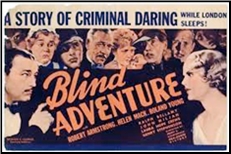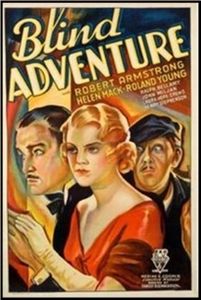Fri 11 Dec 2020
A Movie Review by Dan Stumpf: BLIND ADVENTURE (1933).
Posted by Steve under Mystery movies , Reviews[3] Comments
BLIND ADVENTURE (RKO, 1933) Robert Armstrong, Helen Mack, Roland Young, Ralph Bellamy, John Miljan, Tyrill Davis, and Phyllis Barry. Written by Ruth Rose. Directed by Ernest B. Schoedsack.

This one gets off to a slow start, especially for a movie only an hour long, but stick with it.
Blind Adventure was cobbled together while stars Armstrong and Mack were lolling around on RKO’s dime, awaiting completion of the stop-motion effects in Son of Kong. And it has a charmingly thrown-together look, courtesy of Ruth Rose’s one-damn-thing-after-another story, and Ernest B Schoedsack’s rough-and ready direction.
Things get moving when Robert Armstrong, an American at loose ends in London, gets lost in a foggy night, wanders into a stately town house to get directions, and finds it deserted — except for a dead body (Ralph Bellamy.) He catches a glimpse of someone running out of the house, loses him in the fog, and returns to find the house filled with staid, respectable Englishmen, no dead body in evidence, and everyone assuring him there’s no need to bother the Police.
Enter delightful Helen Mack as a niece visiting staid, respectable relatives she’s never seen. She and Armstrong overhear the others arguing about what to do with them and start to sneak out… only to discover Ralph Bellamy, who it turns out was merely stunned by a bullet grazing his head.

Bellamy explains that the house is full of spies, he’s with the Secret Service, and they must deliver a cigarette case to his boss — the fate of the Free World depends on it.
Fortunately, the story that ensues is not nearly so simple-minded. Twist follows turn, complications compound, and mysteries mount with every scene.
Chief among said complications is a cockney burglar, played to the hilt and then some by Roland Young, usually typed as pusillanimous businessmen, looking delighted with the change. The three principals forge their way through a plot as dense as the London fog that fills the screen, courtesy of Henry W. Gerrard’s evocative photography.
But the real star of this thing is Ruth Rose’s story and her director-husband’s gift for telling it with verve and a certain amount of affection. The critical world will little note nor long remember Blind Adventure, but it offers a pleasant hour of adventure that I shall cherish.

December 11th, 2020 at 11:14 pm
I don’t usually care for Armstrong as a lead actor, but this one is fun and worth the effort to see it.
December 12th, 2020 at 12:38 am
It does sound like fun, and the cast seems ready made for it.
March 15th, 2021 at 9:01 am
[…] may also factor into why Armstrong gets called an ‘ape’ a couple of times in the film.) Mystery*File asserts it is while they were waiting for some stop-motion work to be done on the other […]